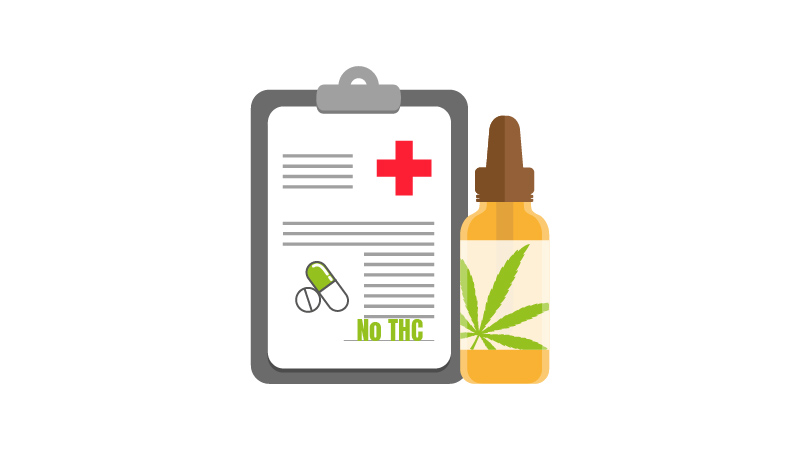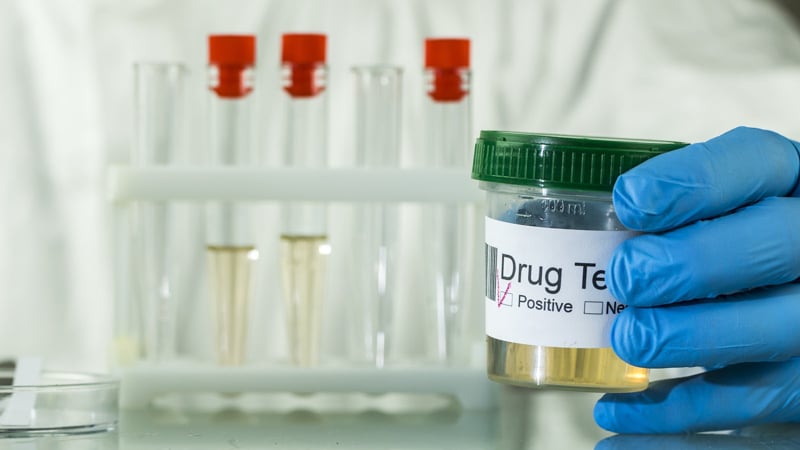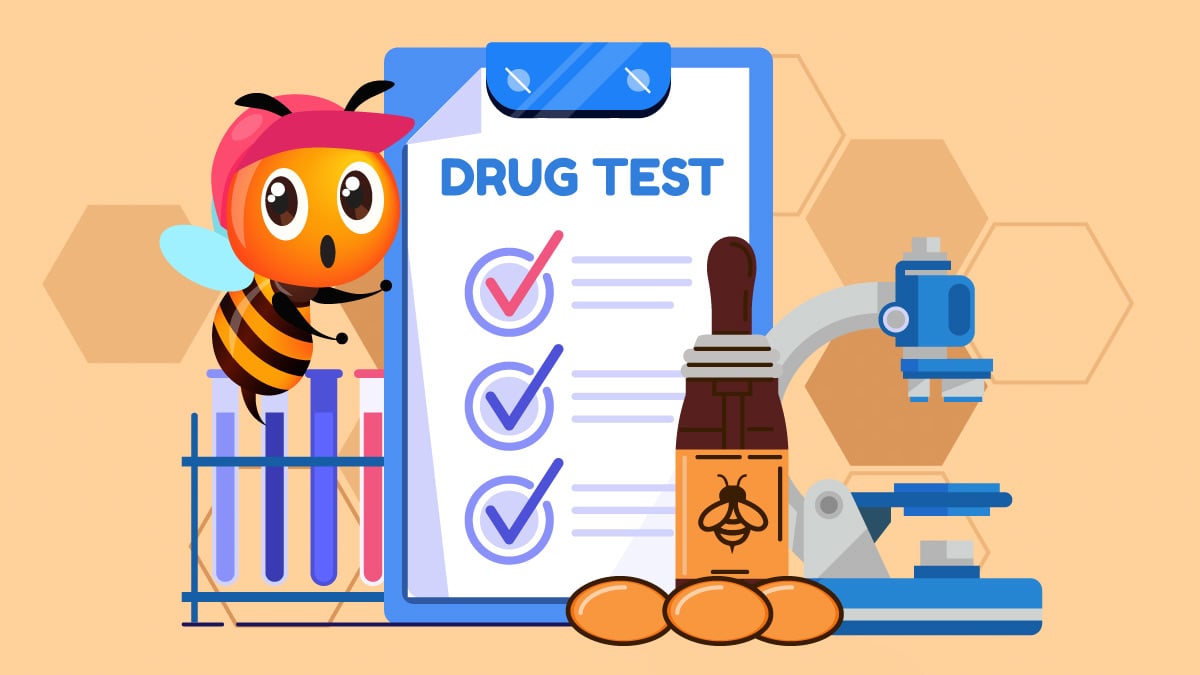Drug testing in non-safety jobs is a steadily decreasing trend, but still, millions of employees in all sorts of industries undergo drug screening in the workplace. Today, a lot of workers use CBD (cannabidiol) in significant quantities to ease physical discomfort, boost focus, and manage stress. For some people, the amount of CBD oil taken daily raises concerns about failing a drug test.
Although CBD alone won’t make you fail one – drug tests don’t look for THC — a CBD oil product is capable of it.
According to Dale Gieringer, co-director of California NORML, there are reports of CBD users who have flunked a drug test (1).
In this article, we’ll explain the ins and outs of cannabis drug testing; what they look for, what the THC threshold is, and how to make sure that your CBD oil won’t show up on screening.
Does CBD Show Up On a Drug Test?
CBD doesn’t show up on a drug test because employers aren’t concerned about testing for it. What they are interested in is THC. It’s the THC — or more precisely, its excess amounts in CBD oil — that can make you fail a drug test.
Here’s how drug tests work. Employers collect and send samples of urine to drug testing companies who analyze them using a machine that can detect trace chemicals in the liquid. Technicians scan the urine for evidence of a byproduct of THC, the main intoxicating ingredient in cannabis.
In order to fail a drug test for THC, an employer would need to have just 50 billionths of a gram per milliliter of urine (50 ng/mL). This is the amount considered as “trace.” under drug-testing rules for federal employees.
There’s also a chance that older, not uncommon types of analytical methods falsely identify THC in a sample with pure CBD. That method is known as gas-chromatography mass-spectrometry and is responsible for tens of thousands of false-positive results from the error annually.
Does CBD Show Up On a Urine Test?
CBD won’t show up on a urine test because such tests don’t look for CBD. If you take low to moderate doses of CBD oil (50 mg/day), you may never fail a urine screen for THC-COOH (THC’s metabolite) (2). It’s not clear how much CBD oil is needed — or for how long — to end up with more than 50 ng/mL of THC-COOH in your urine. When it comes to the time CBD can stay in a person’s urine, it ranges between 2–5 days, but for some individuals, it may take a bit longer to flush the CBD out of the body.
Does CBD Show Up On a Blood Test?
Again, CBD shouldn’t show up on a blood drug test. However, many CBD products contain traces of THC, so if enough THC is present, its metabolite will show up on a drug test. This means that in rare cases, taking large amounts of full-spectrum CBD oil might lead to a positive drug test. Similar to urine, CBD typically stays in the blood for up to 5 days, but that threshold doesn’t apply to everyone. For some individuals, CBD can stay in their system for weeks.
Does CBD Show Up On a Mouth Swab Test?
Mouth swabs don’t look for CBD — they’re checking for THC. So no, CBD won’t show up on a standard road test mouth swab. With THC, it’s a different story. If you consume large amounts of CBD oil with trace levels of THC, there’s a chance that the screening will show you a false-positive result.
Does CBD Show Up On a Hair Follicle Test?
Okay, we know we’re repeating ourselves like history, but workplace hair follicle tests are generally designed to check for THC, not CBD. Hair follicle tests are designed to detect that old standby THC-COOH. But then again, consuming high doses of full-spectrum CBD oil may have you end up with detectable traces of THC’s metabolite in your hair follicle. Any CBD product with trace amounts of THC could leave its byproducts in hair, where they can stick around for a while. Hair follicles can ‘store’ a month-long record of THC use, depending on the length of the hair.
How Much CBD Oil Will Make You Fail a Drug Test?

It’s not about the CBD content when it comes to flunking a THC test. When you fail a screening after taking large amounts of CBD oil for prolonged periods, the traces of THC may accumulate in your system and thus show up on a drug test. If you want to make sure you don’t ingest any THC along with your CBD oil, consider taking CBD isolate or a broad-spectrum extract. Isolate contains pure CBD, whereas broad-spectrum CBD oils come with all the non-psychoactive compounds in hemp but without THC.
It is extremely difficult to gauge how much CBD oil it would take to surpass the 50 ng/mL limit. Even if you take large doses of CBD oil that contains up to 0.3% THC (e.g. 1000 mg), this could theoretically sneak 3 mg of THC into your system.
At more regular doses, such as 2–3 servings per day of standard CBD oil, the estimated THC consumption is around 0.5 mg. This amount would lead to a failed drug test less than 0.2% of the time.
These numbers tell us that there is about a 1-in-500 chance of failing a drug test after taking normal daily doses of hemp-derived CBD oil. Still, users should always check if their product was third-party tested, as many CBD oil labels out there are inaccurate.
Why Is There THC In CBD Oil?
If you take CBD oil from a trusted source, you shouldn’t test positive for the presence of THC on a drug test. But why are there traces of THC in your CBD oil in the first place? Is it normal?
Under federal law, hemp-derived products may contain up to 0.3% of THC. If a cannabis plant comes with more than 0.3%, it is considered marijuana and thus illegal on the federal level. Marijuana-derived CBD is currently legal in individual states that have legalized medical or recreational (or both) use of marijuana.
As mentioned above, it’s natural for hemp-derived CBD oil to contain traces of THC; and these traces may accumulate in your body over time. Taking doses of more than 1000 mg of full-spectrum CBD daily can make you test false positive for THC.
Another reason why THC occurs in your product is possible cross-contamination. Very small amounts of THC occurring in the sourcing material can get into CBD oil in concentrations detectable by drug tests. However, this can be prevented with a process known as fractional distillation. The term refers to an extra step after the initial extraction has been finished. Fractional distillation allows the extractor to separate specific compounds from the hemp extract, and reintroduce them in desired amounts to the final product. However, if this step is done incorrectly, more THC can enter the oil. This also happens with cheaper extraction methods that involve hydrocarbon solvents rather than with CO2 extraction.
Last but not least, there’s a risk of buying a mislabelled product. The CBD market is still unregulated by the FDA, which creates room for fly-by-night vendors who aren’t afraid of churning out low-quality, contaminated products — selling them as a miracle cure. According to one study, almost 70% of the CBD products sold online are mislabelled, causing potential danger to consumers. This is why we always underline the importance of third-party lab testing (3).
How to Make Sure CBD Oil Won’t Make You Fail a Drug Test

Research is paramount when it comes to buying CBD oil. Here’s what you can do to weed out poor-quality suppliers:
- Choose a reputable brand — brands with a well-established reputation in the community usually make high-quality products that you can purchase without breaking the bank. Check the company’s social media, user reviews, and expert blogs to get the big picture. If there’s little to no information about the company outside of its website, you might be playing Russian roulette.
- Look for CO2-extracted CBD — CO2 extraction is the golden standard for the industry. It yields pure and consistently potent extracts without adding additional heat or aggressive solvents. CO2 also reduces the chance of cross-contamination.
- Read third-party lab reports — these reports are known as Certificates of Analysis and are the only way to prove that the product contains the advertised amount of CBD and THC. Independent laboratories check for the cannabinoid content in the tested sample on top of potential contaminants, such as pesticides, mold, heavy metals, or residual solvents. Reputable companies publish Certificates of Analysis on their website or send them on request.
- Know the type of your CBD — full-spectrum CBD oils contain trace amounts of THC (up to 0.3%), so if you want to minimize the error margin, choose broad-spectrum CBD or an isolate-based product. The broad-spectrum option will evoke some of the entourage effects — although not as potent as in full-spectrum CBD — whereas isolate will deliver only the health benefits of CBD.
Can CBD Turn into THC in the Body?
There have been rumors spread online that stomach acid can turn CBD into THC.
In a 2016 in-vitro study, the authors concluded that simulated gastric fluid can transform CBD into THC. However, a 2017 review of studies stated that in-vitro conditions don’t represent the actual environment in the human stomach, where a similar transformation is unlikely to occur (4–5).
The researchers in the 2017 review also mentioned that among the reliable clinical studies available, none have talked about the side effects of CBD similar to those produced by THC.
If you want to learn more details about this phenomenon and its limitations, we encourage you to read an article by Dr. Ethan Russo titled “Cannabidiol: Claims and Misconceptions,” where he debunked the stomach acid theory. The article has been published in “Trends in Pharmacological Sciences.” (6)
Does CBD Oil Show Up On a Drug Test? Not Really, But Sort of
CBD alone won’t make you fail a drug test. These tests aren’t designed to look for CBD. Instead, they check for THC-COOH, which is the byproduct of THC. When your drug test score shows 50 ng/mL of THC in the tested sample, it will show a positive result. This may happen when a person takes very high doses of full-spectrum CBD oil daily (upwards of 1000 mg) for long periods of time. Full-spectrum CBD oil comes with up to 0.3% THC, but when you take regular doses, the risk of failing a drug test is 1-to-500.
When buying CBD products online, always make sure to verify the credibility of your supplier. Check for Certificates of Analysis from third-party laboratories to ensure the purity of your product, especially if your job entails regular drug tests.
The trend of workplace drug testing for cannabis is slowly but surely decreasing. As the legalization continues to roll across the country, more companies will abandon this idea, but for now, it’s better to err on the side of caution. If you’re particularly concerned about failing a drug test with CBD oil, we suggest that you turn to broad-spectrum CBD products or isolates. Both forms of CBD — when properly manufactured — should be free of any THC.
What’s your experience with CBD oils and drug testing? Have you ever got a false positive result from taking full-spectrum CBD? Share your stories in the comments!
References:
- Gieringer, D. “Drug Testing – Marijuana Testing Tips.” Retrieved from: https://norml.org/marijuana/drug-testing-tips/
- Goodwin, Robert S et al. “Urinary elimination of 11-nor-9-carboxy-delta9-tetrahydrocannabinol in cannabis users during continuously monitored abstinence.” Journal of analytical toxicology vol. 32,8 (2008): 562-9. doi:10.1093/jat/32.8.562
- Merrick, John et al. “Identification of Psychoactive Degradants of Cannabidiol in Simulated Gastric and Physiological Fluid.” Cannabis and cannabinoid research vol. 1,1 102-112. 1 Apr. 2016, doi:10.1089/can.2015.0004
- Nahler, Gerhard et al. “A Conversion of Oral Cannabidiol to Delta9-Tetrahydrocannabinol Seems Not to Occur in Humans.” Cannabis and cannabinoid research vol. 2,1 81-86. 1 May. 2017, doi:10.1089/can.2017.0009
- Russo, Ethan B. “Cannabidiol Claims, and Misconceptions.” Trends in pharmacological sciences vol. 38,3 (2017): 198-201. doi:10.1016/j.tips.2016.12.004
